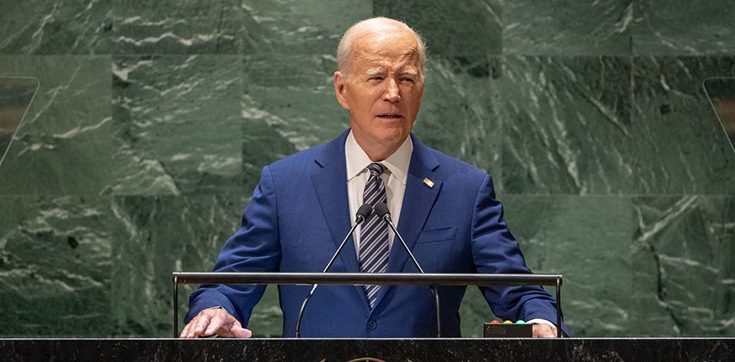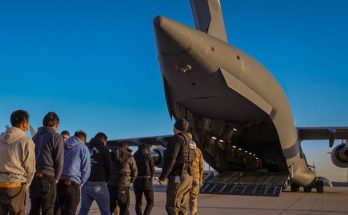IBNS: The territorial integrity and human rights that form the foundation of the UN must be collectively defended, United States President Joseph Biden said on Tuesday.
Yet, for the second year in a row, the annual debate at the UN General Assembly is “darkened by the shadow of war, an illegal conquest brought without provocation by Russia” against Ukraine, he said, expressing strong support for Kyiv.
“Russia alone bears the responsibility for this war…and has the power to end it immediately,” he emphasized, asking whether the independence of any nation is secure “if we allow Ukraine to be carved up”.
“We have to stand up to this aggression today and deter other would-be aggressors tomorrow,” he said, stressing that the US, together with its allies and partners around the world, will continue to stand with Ukraine as it defends its sovereignty and territorial integrity and their freedom.
“It’s not only an investment in Ukraine’s future but in every country.”
Bending arc of history
At the outset, he recalled a recent trip to Viet Nam, saying it would be “unthinkable” for a US President to stand in Hanoi announcing a mutual commitment, following a painful legacy of war.
“Our history need not dictate our future,” he said. “With a concerted leadership, adversaries can become partners, overwhelming challenges can be resolved, and deep wounds can heal. When we choose to stand together, we hold in our hands the power to bend the arc of history.”
‘Our future is bound to yours’
The US seeks a more secure, more prosperous, more equitable future for all people because “we know our future is bound to yours,” he said. “No nation can meet the challenges of the day alone.”
To meet new challenges, old institutions must be updated, bringing in leadership from regions that have not always been included to address such issues as Security Council reform and investment in developing countries.
“Twenty-first century results are badly needed to move us along,” he said. “That starts with the United Nations, right in this room.”
The UN must continue to preserve peace and prevent conflict and must also govern the benefits and challenges of emerging technologies, including artificial intelligence (AI), he said.
Regional relations
Highlighting ongoing developments across regions, he pointed efforts to support a just and lasting peace, with two States for Israelis and Palestinians. Turning to US relations with China, he said Washington seeks “to responsibly manage” bilateral competition “so it does not tip into conflict”, he said, adding that “we are for de-risking, not decoupling” with Beijing.
Climate crisis
The climate crisis needs critical attention, he said, pointing to tragic flooding in Libya alongside historic drought and deluge at a time when the world is still dependent on fossil fuel.
For its part, the US has treated this threat as an existential crisis since that start of his Administration, including new laws and initiatives.
“This year, the world’s on track to meet the climate finance pledge made under the Paris Agreement: $100 billion to raise collectively,” he said, “but we need more investment on public and private sector, especially in places that have contributed so little to global emissions.”
Global goals
To accelerate global progress on the Sustainable Development Goals (SDGs), “we all need to do more,” he said, pledging Washington’s commitment.
On security issues, he said the US destroyed the last of its chemical weapon stockpile in 2023. Meanwhile, Russia is “shredding” long-standing arms control agreements, he added.
Condemning the DPRK’s continued violations of Security Council resolutions, he encouraged diplomacy to resolve outstanding issues. In terms of Tehran’s destabilizing activities that threaten regional and international security, he said “Iran must never acquire a nuclear weapon.”
Power is ‘in our hands’
The Universal Declaration for Human Rights was adopted 75 years ago, but attention is still needed to tackle discrimination.
However, the power is “in our hands” to forge a safer, more sustainable world for all through partnerships and collective hope, he said.
“At this inflection point in history, we’re going to be judged by whether or not we live up to the promises we made to ourselves, to each other,” he said.
“Will we find within ourselves the courage to do what must be done, to defend the tenets of the UN?” he asked. “There’s only one answer to that question. We must, and we will. Let’s do this work together. Let’s bend the arc of history for the good of the world. It’s in our power to do it.”





